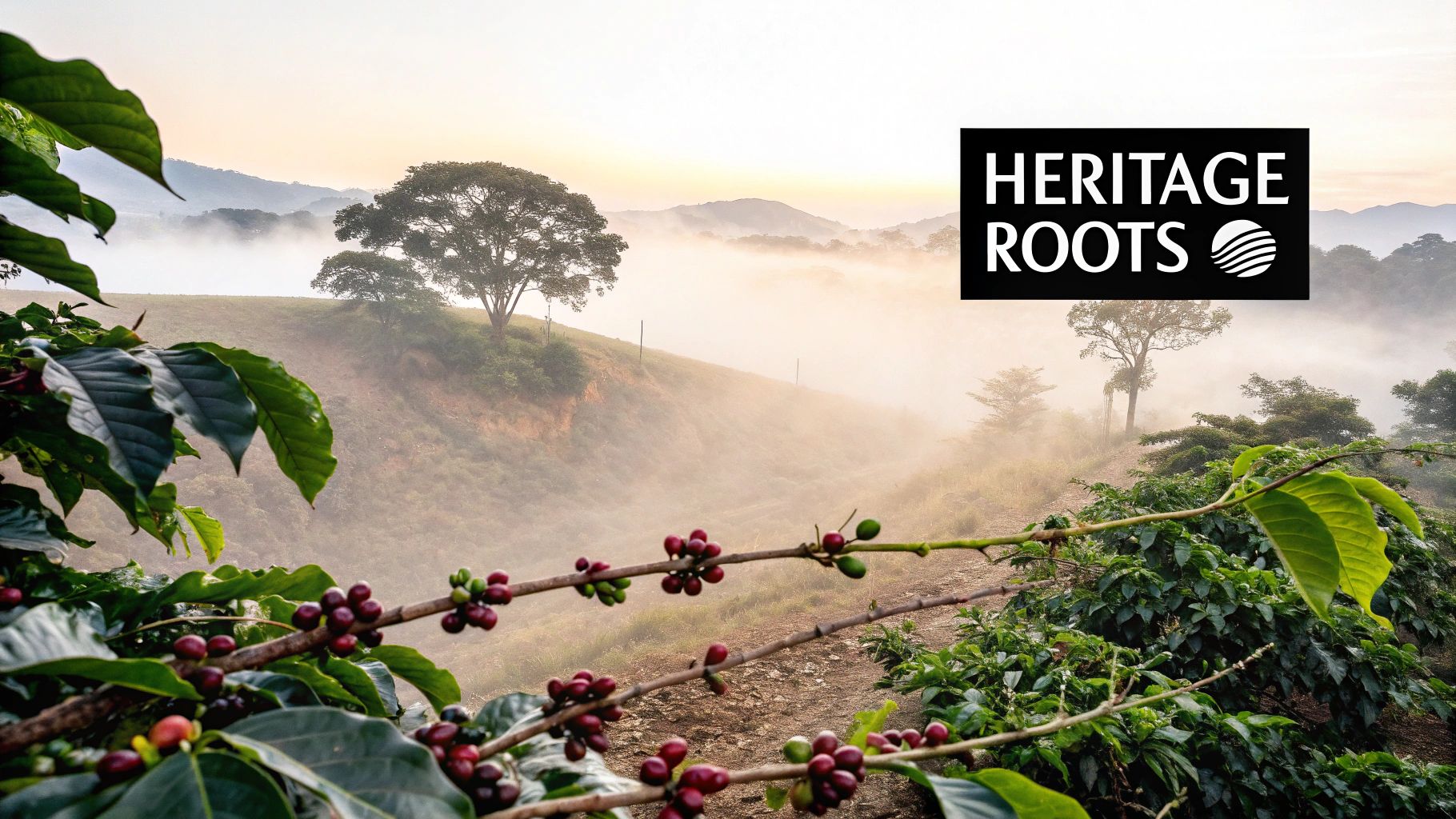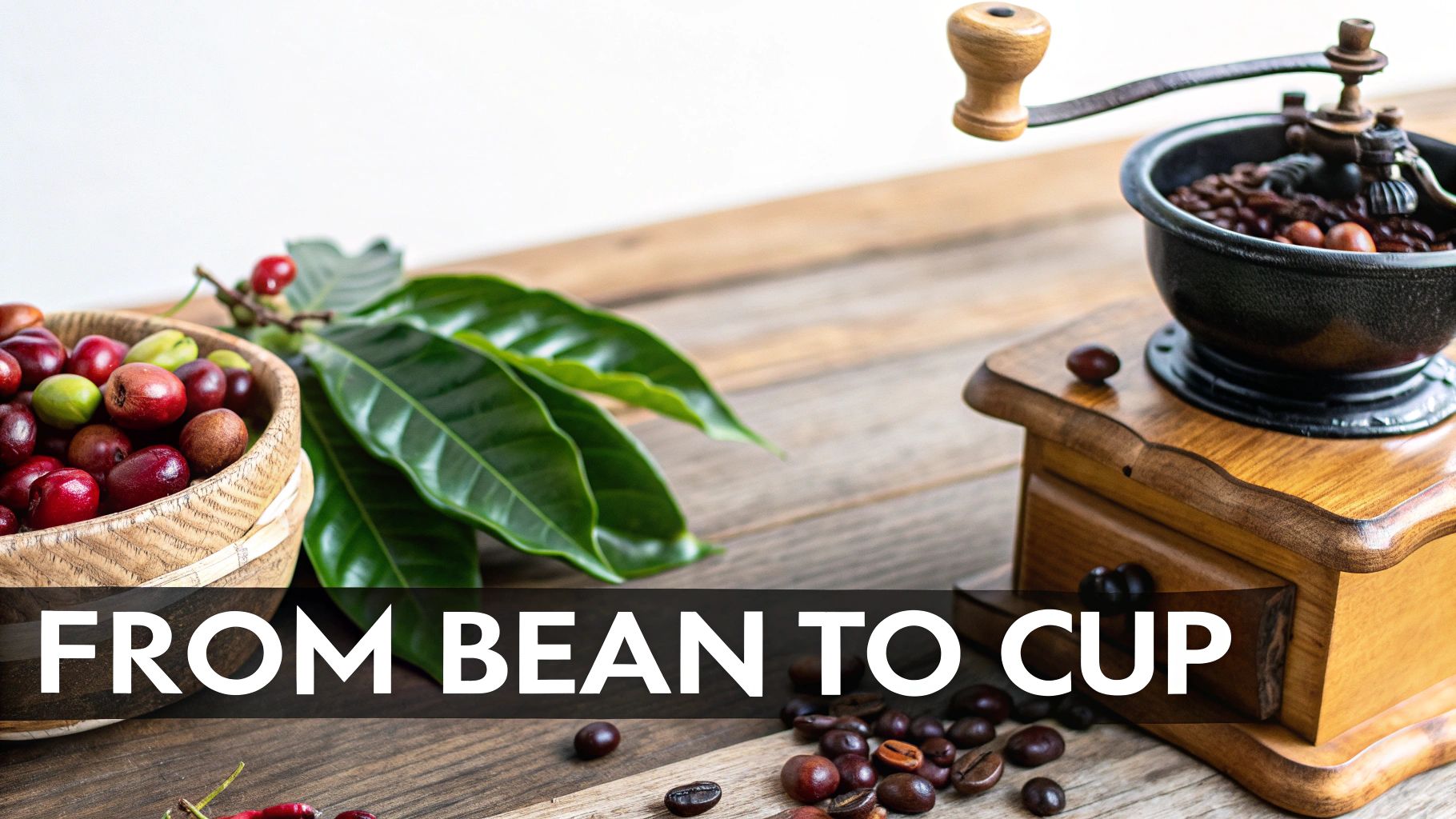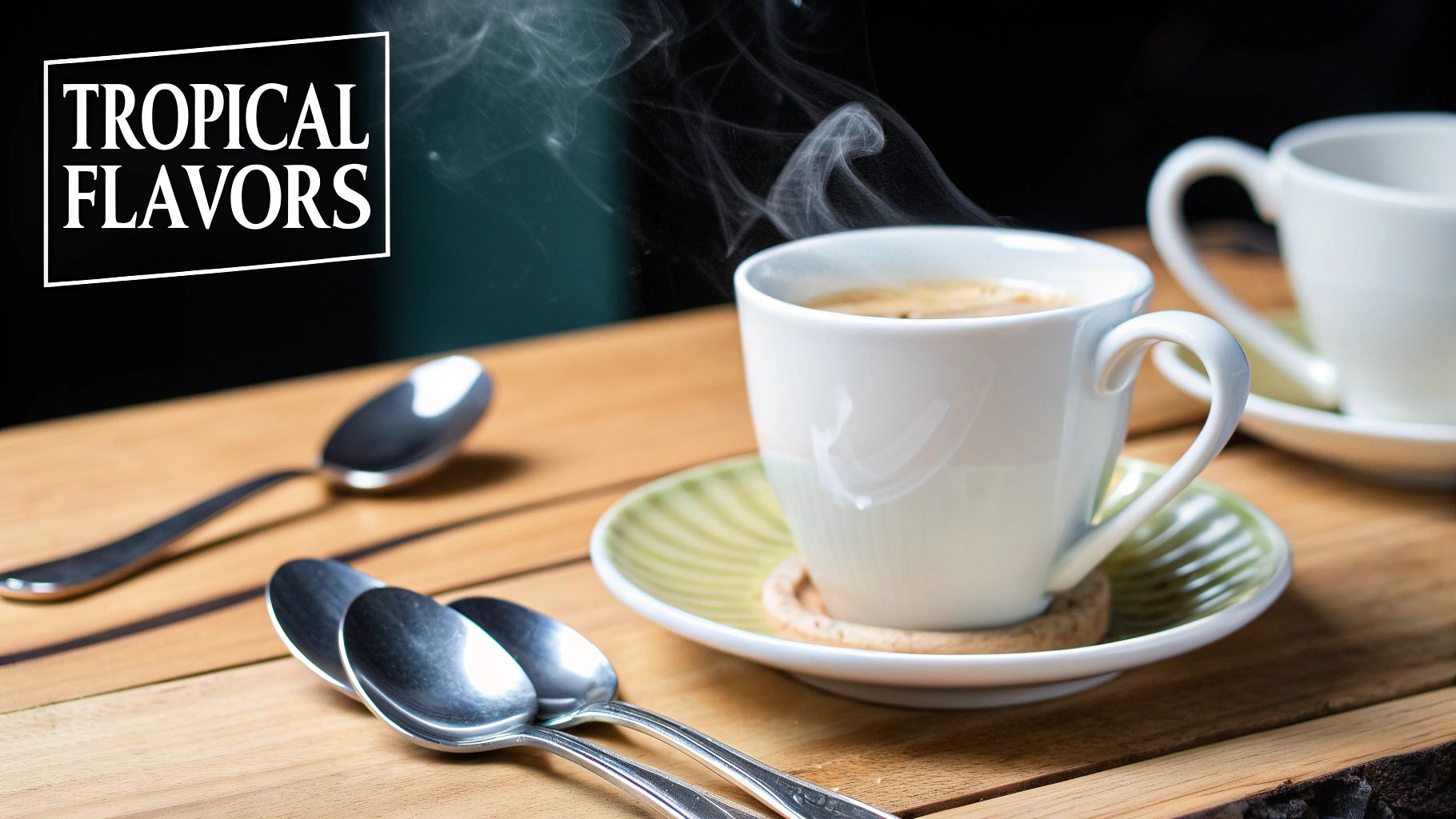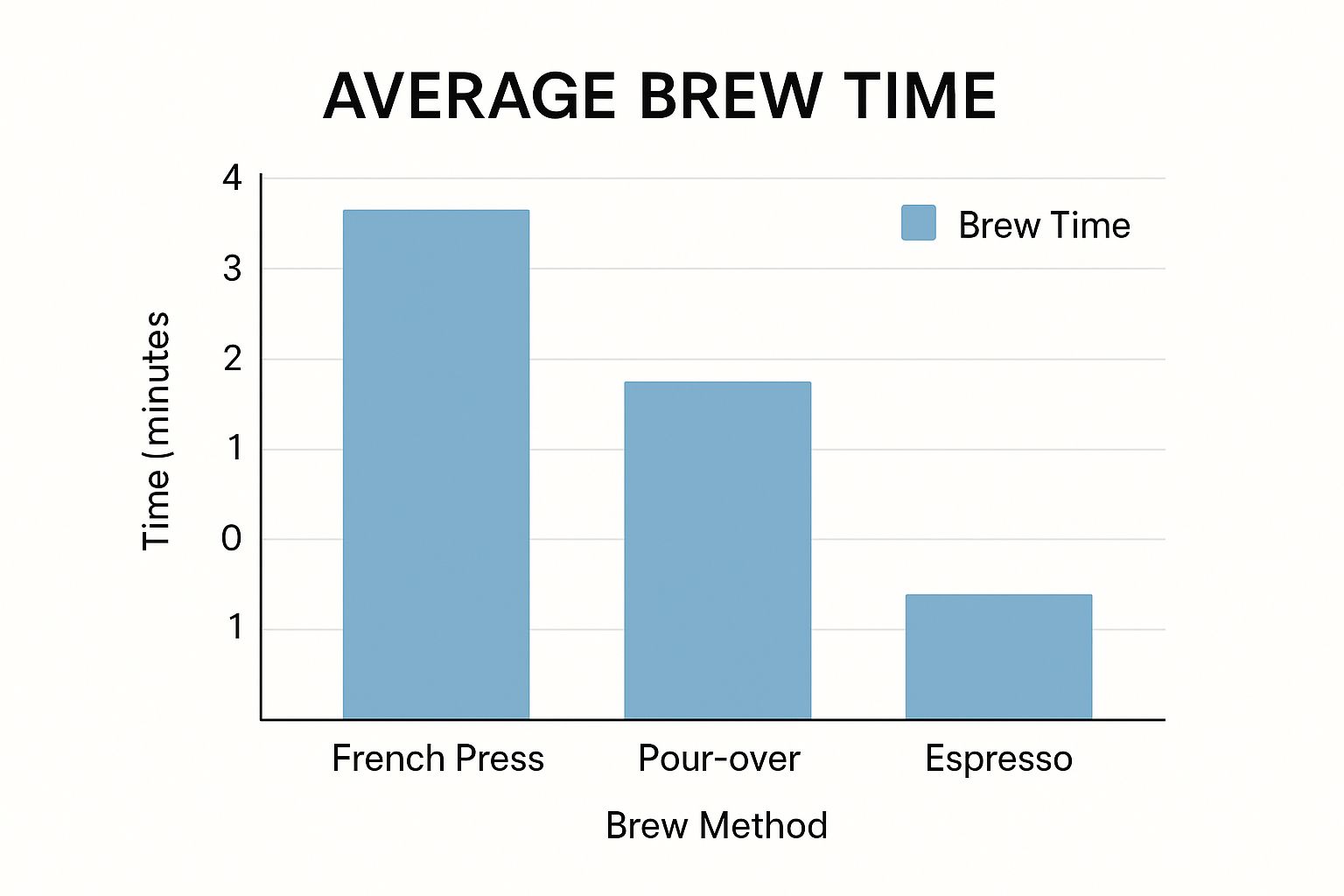Jamaica Coffee The Ultimate Explainer
- koteswar rao karanam
- Oct 7
- 12 min read
Talk to any true coffee lover, and they'll tell you about Jamaica Blue Mountain. It's often called the "gold standard" by connoisseurs, and for good reason—it’s known for an exceptionally smooth, balanced flavor with practically zero bitterness. This isn't just your average cup of coffee; it's the pinnacle of premium, a luxury experience born from unique growing conditions and incredibly strict quality control. You’re not just drinking a beverage; you’re tasting an agricultural masterpiece.
What Makes Jamaica Coffee So Special

Imagine a coffee so refined and elegant that people compare it to a fine, aged wine. That's the heart and soul of Jamaica coffee. Its stellar reputation is built on a foundation of pure harmony—a delicate dance of aroma, body, and acidity that truly sets it apart. This one-of-a-kind character comes directly from its exclusive home and the painstaking process behind every single bean.
The journey starts high up in the misty peaks of Jamaica's Blue Mountains. This is a legally protected geographical region, meaning only coffee grown here can carry the prestigious name. It’s here that a perfect storm of environmental factors creates the ideal nursery for coffee cultivation.
The Elements of Excellence
The magic behind this coffee isn't just one thing. It's a symphony of nature and human dedication working together. This beautiful blend of terroir and craft is what elevates it from a simple morning habit into a genuine gourmet experience.
So, what are the key factors?
Exclusive Growing Conditions: The combination of high altitude, cool mist, and nutrient-rich volcanic soil means the coffee cherries mature much more slowly. This extended ripening time allows more complex sugars and deep flavors to develop within the bean.
Meticulous Harvesting: There’s no machine work here. Only the ripest, most perfect red cherries are picked by hand, one by one. This ensures incredible consistency and quality right from the very start.
Strict Quality Control: Every single barrel of beans is rigorously inspected and certified by the Coffee Industry Board of Jamaica. This is a guarantee of authenticity that very few other coffees in the world can claim.
Because Jamaican coffee is such a celebrated single-origin bean, it helps to spend a moment understanding single-origin coffee to appreciate its unique appeal. This intense focus on one specific geographic source is the secret to its distinct flavor profile.
This incredible commitment to quality has turned a humble crop into a global treasure. And for discerning coffee lovers right here in Dubai, getting your hands on this level of authenticity is now easier than ever, thanks to dedicated purveyors like IFM Gourmet.
The Rich History Behind the Beans

The story of Jamaican coffee is fascinating, a real blend of royalty, revolution, and incredible resilience. It all kicked off back in 1728 when the King of France, Louis XV, gifted a single coffee plant to the governor of Martinique. From that one plant, a few precious seedlings eventually found their way to Jamaica.
They were planted in the lush, fertile foothills of St. Andrew, and just like that, an entire industry was born.
For over a century, coffee production on the island absolutely boomed, turning Jamaica into a global powerhouse. Huge, sprawling plantations, worked by enslaved people, pumped out massive quantities of coffee destined for the European market. It was an era that cemented Jamaica's place on the world stage as a titan of the coffee trade.
During its peak in the 19th century, Jamaica was a force to be reckoned with. Between 1800 and 1840, the island was producing an estimated 70,000 metric tons of coffee every year, making it one of the largest producers in the world. But the abolition of slavery in the 1830s changed everything, causing a dramatic decline in production for the labor-intensive industry. You can dive deeper into how the Jamaica coffee sector has evolved on perfectdailygrind.com.
A Shift from Quantity to Quality
This downturn wasn't the end of the story—it was the beginning of a new one. The industry had to completely rethink its approach. The massive plantations started to give way to a network of smaller farms, often cultivated by families who had a deep, personal connection to the land.
This moment marked a crucial turning point. The focus shifted dramatically from churning out huge volumes to mastering the craft of coffee growing. These smaller farms began concentrating on producing the absolute highest-quality beans they possibly could, knowing the unique climate of the Blue Mountains was their greatest asset.
This strategic pivot wasn't just about survival; it was about reinvention. The industry consciously moved away from being a volume player to becoming a symbol of ultra-premium quality, focusing on the very best beans from the most ideal locations.
The Rise of a Legend
This new, quality-first approach laid the foundation for the legendary reputation of Jamaica Blue Mountain coffee. The focus on handcrafted cultivation and meticulous processing created a product that was simply on another level. It was hard work, but the results spoke for themselves: a coffee with a flavor profile that was second to none.
This dedication to excellence is what cemented its status as a true symbol of luxury and craft. Today, you can taste that rich history in every single sip. It’s a story of an industry that overcame immense challenges, adapted to change, and ultimately chose a path of uncompromising quality to create one of the world's most sought-after coffees.
Inside the Blue Mountains Terroir

The secret to the sublime flavor of Jamaica coffee isn't a recipe; it's a very specific place on Earth. The Blue Mountains are much more than a location—they are a perfectly calibrated natural greenhouse. This unique environment, or terroir, nurtures coffee beans in a way that simply can't be replicated anywhere else.
This exceptional setting is a delicate harmony of four key factors. Each one plays a critical role in shaping the final taste you experience in your cup, working together to create something truly special.
Nature’s Perfect Formula
Think of the Blue Mountains as a master artisan, slowly and carefully shaping each coffee cherry. The region's unique geography provides the ideal toolkit for producing beans with remarkable complexity and depth.
These natural advantages include:
High Altitude: Grown at elevations typically above 1,500 metres, the cool mountain air slows down the coffee cherry's growth cycle.
Rich Volcanic Soil: The soil is incredibly fertile and drains well, packed with essential nutrients that feed the coffee plants.
Persistent Mist: A constant, gentle cloud cover shields the plants from the harsh tropical sun, keeping temperatures cool and stable.
Gentle Rainfall: The area gets just the right amount of rain to ensure the coffee cherries ripen evenly without becoming waterlogged.
This unique combination forces the coffee cherries to mature very slowly. This extended ripening period isn't a drawback; it's the secret to its excellence. It allows the beans to become much denser and absorb more complex sugars and nutrients from the fruit, resulting in a richer, more profound flavor.
The name 'Jamaica Blue Mountain' isn't just a brand; it's a legally protected designation. This means only coffee grown within a strictly defined geographical area can carry this prestigious label, ensuring its authenticity and rarity.
Upholding the Gold Standard
To protect this legacy, the Coffee Industry Board of Jamaica (CIB) enforces some of the toughest quality control standards in the world. Every single bean must be inspected and certified before it can be exported, guaranteeing that it meets the highest benchmarks for size, density, and flavor. This meticulous oversight reinforces its exclusivity and assures you that you're getting genuine, top-tier Jamaica coffee.
This delicate terroir is both a blessing and a challenge. While the region currently dedicates about 8,000 hectares to cultivation, environmental factors are a constant threat to production. In fact, over 80% of this prized coffee is exported to Japan, which speaks volumes about its premium international status. To dig deeper into the industry, you can learn more about the Jamaican coffee industry on en.wikipedia.org.
Exploring Jamaican Coffee Flavor Profiles
To really get what authentic Jamaica coffee is all about, you have to go beyond the usual descriptions and step into its world of complex flavors. The whole experience starts with its most famous trait: a stunningly mild and clean cup. This isn't a coffee that screams for attention; it's one that whispers, letting its elegance unfold with every single sip.
One of its most beloved qualities is that it has almost zero bitterness. A lot of coffees can leave a harsh, dry feeling behind, but Jamaica Blue Mountain is incredibly smooth from the first taste to the last. This is balanced by a bright, gentle acidity that gives it a lively spark without ever being sour or sharp. It’s a fine-tuned balance that very few coffees in the world manage to pull off.
The body—how the coffee feels in your mouth—is full and wonderfully round. It coats your palate with a velvety texture, creating a luxurious and comforting sensation that makes you want to hold onto every drop.
A Symphony of Aroma and Taste
Beyond its core traits of mildness and smoothness, you'll find a rich tapestry of subtle notes just waiting to be discovered. The aroma alone is an invitation, often hinting at delicate floral undertones mixed with a soft, nutty sweetness. It's a scent that promises something special is on its way.
When you take a sip, those aromas come alive in a beautifully complex flavor profile. The initial taste is clean and crisp, which then opens up into notes of sweet herbs, nuts, and sometimes even a hint of cocoa. It all comes together in a sweet, lingering finish that stays with you long after the cup is gone.
To really appreciate its special place in the coffee world, it helps to put it side-by-side with other top-tier single-origin beans.
Jamaican Coffee Flavor Profile Comparison
This table compares the typical tasting notes of Jamaica Blue Mountain coffee with other globally renowned single-origin coffees to highlight its unique characteristics.
Attribute | Jamaica Blue Mountain | Ethiopian Yirgacheffe | Colombian Supremo |
|---|---|---|---|
Acidity | Bright, Smooth, Mild | High, Bright, Wine-like | Medium, Bright, Clean |
Body | Full, Velvety | Light to Medium, Silky | Medium, Rounded |
Key Notes | Floral, Nutty, Sweet Herbs | Floral, Citrus, Berry | Caramel, Nutty, Fruity |
Bitterness | Very Low | Low | Low to Medium |
As you can see, while other famous coffees have their own distinct strengths—like the wine-like acidity of an Ethiopian Yirgacheffe or the caramel notes of a Colombian Supremo—Jamaica Blue Mountain stands out for its exceptional smoothness and elegant balance.
The Impact of Brewing
The brewing method you pick makes a huge difference in which of these delicate flavors you bring to the forefront. The chart below shows the average brew times for a few common methods, and each one unlocks a different side of the coffee's personality.

As the chart shows, a French Press needs a longer brew time, which really brings out the coffee's full, velvety body. On the other hand, faster methods like a pour-over can highlight its bright acidity and those delicate floral notes. This gives you a clear idea of how a little thing like time can completely change what you taste in your cup.
Brewing Your Perfect Cup at Home
To truly honor the delicate profile of a premium Jamaica coffee, how you brew it is everything. Think of it like a chef choosing the right pan—the technique is essential for bringing out the best in your main ingredient. The goal here is to highlight that celebrated smoothness and clean finish, not to steamroll over it.
This means you’ll want to choose methods that allow for gentle extraction. It's more of a conversation with the coffee grounds than an interrogation. Techniques that give you control over variables like water temperature and flow rate are perfect for coaxing out those subtle floral and nutty notes.
Pour-Over for Clarity
There's a reason connoisseurs love the pour-over method, especially with a V60 dripper. It lets water pass through the coffee at a steady, controlled pace, which results in an incredibly clean and crisp cup. This really lets the bright acidity and delicate aromas of Jamaican coffee shine.
For the best results:
Grind Size: Use a medium-fine grind, something like the texture of table salt.
Water Temperature: You're aiming for water that’s just off the boil, right around 90-96°C.
Ratio: A 1:16 ratio is a great place to start—that's 1 gram of coffee for every 16 milliliters of water.
French Press for Body
If you’re someone who prefers a cup with a richer, fuller body, the French Press is a fantastic choice. This is an immersion method, meaning the grounds steep directly in the hot water. This process pulls out more of the natural oils and soluble compounds, giving you a velvety, robust brew that showcases the coffee's smooth texture and sweet finish.
The secret to a great French Press is getting the grind right. Use a coarse grind. If it's too fine, you'll end up with a muddy, over-extracted cup that completely hides the coffee's delicate character.
Siphon for Precision and Theatre
For those who really enjoy the ritual of making coffee, the siphon (or vacuum pot) offers both precision and a bit of a show. This method uses vapor pressure to push hot water up into a chamber with the coffee grounds. Then, a vacuum pulls the brewed coffee back down through a filter.
The result is an exceptionally clean and vibrant cup, similar to a pour-over but with a slightly fuller body. It's a wonderful way to experience the full spectrum of flavors a high-quality Jamaica coffee has to offer. And remember, the quality of your water matters just as much as the beans. Using premium spring water, like the one in this image of Lurisia water, can make a world of difference in the final taste.
Finding Authentic Jamaican Coffee in Dubai
So, you’ve learned all about the incredible history and nuanced flavors of Jamaican coffee. Now for the most important part: getting your hands on the real deal. For any true coffee lover in Dubai, the challenge is sifting through a crowded market to find genuine, high-quality beans. Authenticity is everything, and finding a supplier you trust is the only way to guarantee you're getting that famously smooth, celebrated character.
This is where a dedicated expert makes all the difference. If you're looking for an exceptional taste of the Caribbean here in the UAE, your search for authentic Jamaica coffee ends with a trusted local purveyor of gourmet delicacies.
Your Trusted Source for Gourmet Excellence
IFM Gourmet Dubai is the luxury online gourmet arm of IFM Investments LLC, a culinary-focused company based in the UAE. Their gourmet store offers an impressive lineup of artisanal delicacies, including sweets, savories, fine chocolates, premium teas, cakes, and beautifully curated gift hampers. They are part of the broader Italian Food Masters group and are known for quality, authenticity, and culinary elegance in Dubai’s gourmet scene.
What does this mean for you? You’re not just buying coffee; you’re buying a guaranteed authentic experience. IFM Gourmet has built its name on bringing the world's most sought-after delicacies to Dubai, making them the perfect partner for any coffee enthusiast.
Their incredible lineup goes far beyond just coffee. Think artisanal sweets, fine chocolates, premium teas, and elegant gift hampers that have made them a leader in Dubai’s gourmet world. As part of the wider Italian Food Masters group, IFM Gourmet is the bridge connecting world-class producers with customers who appreciate true quality.
For anyone inspired to try this exceptional brew, IFM Gourmet offers a direct path to acquiring it. They make the world's finest Jamaica coffee accessible, ensuring every single cup you make at home is as genuine and flavorful as it was always meant to be. Explore their full range of artisanal products and gourmet collections and take your home brewing to the next level.
Your Jamaican Coffee Questions Answered
Got a few lingering questions about Jamaica coffee? You're not alone. Let's tackle some of the most common ones so you can feel confident as you explore this incredible brew.
Why Is Jamaica Blue Mountain Coffee So Expensive?
The price tag on authentic Jamaica Blue Mountain coffee boils down to one simple thing: a tiny supply and massive global demand. This isn't just marketing hype; it's a reflection of the incredible effort and unique geography behind every single bean.
Here’s what drives the cost:
A Tiny Growing Region: The official, legally defined coffee-growing area in the Blue Mountains is incredibly small. There's only so much land that qualifies.
Labour-Intensive Harvesting: The steep, rugged mountainside makes machinery useless. Every coffee cherry has to be picked carefully by hand.
Rigorous Certification: Before it can be sold, every bean is scrutinized by the Coffee Industry Board of Jamaica (CIB). Only the absolute best of the best get the seal of approval.
When you put all that together, you realize the price reflects the immense amount of dedicated, hands-on work required to produce coffee of this quality.
How Can I Be Sure My Coffee Is Authentic?
This is a crucial question. To make sure you’re getting the real deal, look for one thing: the official certification seal from the Coffee Industry Board of Jamaica. It has to be on the packaging.
The CIB seal is your non-negotiable guarantee. Without it, there’s no way to know if the coffee was grown and processed under the strict standards that make this bean a global icon.
The easiest way to avoid fakes is to buy from a supplier you trust. A specialty food purveyor like IFM Gourmet Dubai, which stakes its reputation on sourcing authentic artisanal products, gives you peace of mind that you're investing in the genuine article.
What Is the Best Way to Store the Beans?
Proper storage is key to protecting the delicate, nuanced flavors of your Jamaica coffee. Keep the beans in an opaque, airtight container at room temperature. The biggest threats to your coffee's freshness are oxygen, light, heat, and moisture.
And a pro tip: avoid the fridge or freezer. While it might seem like a good way to keep them fresh, temperature changes create condensation. That moisture will ruin the beans and mute their beautiful flavor profile almost instantly. A cool, dark pantry is the perfect spot.
Can I Use Jamaican Coffee for Espresso?
You absolutely can, but it’s worth thinking about what makes this coffee special first. Its charm lies in its subtle, complex flavors and famously smooth, non-bitter finish. These qualities shine brightest with brewing methods that emphasize clarity, like a pour-over or a French press.
A dark, heavy roast typical for espresso can easily overpower the delicate floral and nutty notes. That said, pulling a shot of a light-roasted Jamaica Blue Mountain bean can create a uniquely smooth, sweet, and memorable espresso that’s unlike anything else you’ve ever tasted.
Ready to experience the world's most celebrated coffee for yourself? IFM Gourmet Food Store offers authentic, certified Jamaican coffee, delivered right to your door in Dubai. Discover the pinnacle of flavour and smoothness today.


Comments